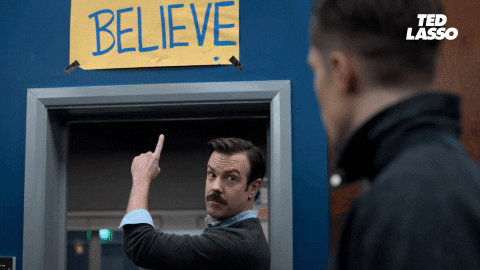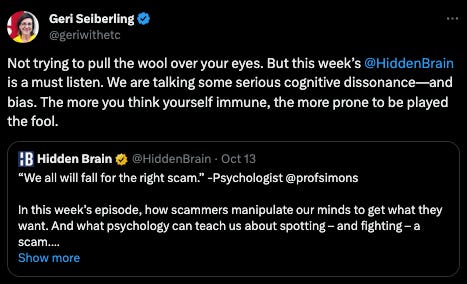How our experiences shape our beliefs
Plus, the perks of determinism
“A good thing happens to you. You say, I'm gonna appreciate this forever. I'm never gonna sweat the small stuff again. Fast forward a few months, you worry about all these tiny things you swore you never would.” –Thomas Gilovich
BRAIN WAVES
Believe it. Is the glass half full or half empty? If you live a privileged life, you probably see it as the former, right? Not quite, suggests a newly published study. The study analyzed survey data regarding participants' fundamental beliefs about the world – something researchers call “primal world beliefs.” It turns out there wasn’t much of a relationship between a positive worldview and indicators of privilege. The opposite was also true: living a less privileged life – battling chronic illness, for example– didn’t make people think the world was a bad place. Our experiences seem to shape our worldviews less than we think, although there was one exception to the rule. Childhood trauma was indeed associated with the belief that the world is dangerous. Still, the study shows that the relationship between our beliefs and our personal experiences is “actually much smaller than people expect,” said co-author Nicholas Kerry.
Free will. In the great debate over free will, there’s an argument to be made for the benefits of determinism – the idea that everything is determined by causes outside our control. When you embrace a deterministic worldview, “anything good that happens to you feels like a blessing – like a wondrous gift you are granted, rather than a paycheck you have earned,” psychologist Francis Merson writes. Merson makes the case that determinism frees us of the pressure to be perfect and allows us to be more empathetic to others. Many of our greatest thinkers, including Albert Einstein, surrendered to the idea that we have less control over our lives than we think we do, and “such a worldview provides a powerful check to pride and arrogance,” Merson argues.
Go team! It’s easy to think that the best teams are collections of highly accomplished or talented individuals, working under a skilled leader. But the best teams are far more than the sum of their parts, and share certain basic characteristics. Listen to learn more.
ON THE HIDDEN BRAIN PODCAST
The Enemies of Gratitude: One of the mysteries of human behavior is that it’s often easier to focus on what’s going wrong than on what’s good in our lives. Why is that? Psychologist Thomas Gilovich studies the barriers that prevent us from feeling gratitude, and how we can overcome them.
ON THE MY UNSUNG HERO PODCAST
Robin Annexstein’s Story: More than 10 years ago, when Robin’s father died, a man at the U.S. passport office offered a moment of relief.
Don’t forget to send us the story of your unsung hero! Record a voice memo on your phone and email it to myunsunghero@hiddenbrain.org.
ON HIDDEN BRAIN+
Decisions by Design: Nobody likes being told what to do. But left to our own devices, many of us make choices that fail to serve our best interests. Enter the world of choice architecture: where decisions are intentionally presented to “nudge” us toward a certain outcome. In part two of our conversation with behavioral economist Richard Thaler, we look at some of the ways choice architecture shapes all of our lives, and how nudges can be used for both good and nefarious purposes.
Have you tried out Hidden Brain+ yet? You can find it by searching for our show in the Apple Podcasts app, or by going to apple.co/hiddenbrain.
FROM OUR LISTENERS
MIND GAMES
In 1990, a person is 15 years old. In 1995, that same person is 10 years old. How can this be?
LAST WEEK’S PUZZLE
What do the following words have in common: revive, banana, grammar, voodoo, assess, potato, dresser, uneven?
The answer: If you remove the first letter, they become palindromes.
A MOMENT OF JOY
A decent proposal…
Have an idea for Hidden Brain? A story you want to share with us? Send an email to ideas@hiddenbrain.org. Listen to us on Spotify, Apple, Amazon Music or your favorite podcast platform.



